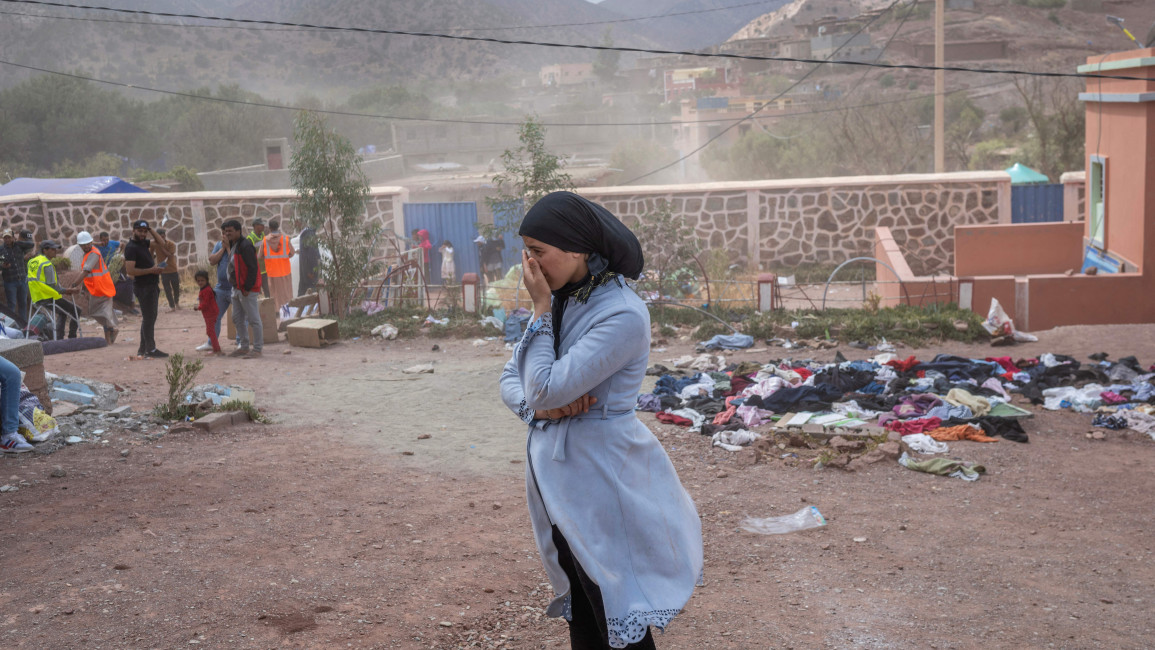Morocco: Survivors of the earthquake now have to survive rainstorms and floods
After surviving the strongest earthquake in a century, hundreds of Moroccans still remain in camps and have been displaced once again after a storm hit the country.
Over the weekend, gusty winds reached speeds of up to 100 kilometres per hour (km/h) off the northwest coast of Morocco.
In Douar Douzrou, near Taroudanet city, the heavy stones the camp residents used to anchor their tents could only resist for a few minutes before chaos erupted.
"All tents were destroyed. We found ourselves homeless again. We warned about that but no one listened," Mouhssin, a resident of the village, told The New Arab.
When the earthquake struck the region on 8 September, Mouhssin lost his pregnant wife, his mother and a close friend.
He managed to save his son after five hours of digging with his bare hands. Today, the 30-year-old man, says his heart can bear no more tragedy.
Morocco's 6.8 magnitude earthquake killed over 3000 people and damaged 2,930 villages in the High Atlas mountains, that holds a total population of 2.8 million people.
A powerful hurricane named "Bernard" is currently heading towards the Strait of Gibraltar, provoking adverse weather conditions and severe storms across cities in Morocco and southern Europe.
In Amezmiz, another region affected by the quake, Saturday's rain flooded a camp of hundreds of villagers who sheltered in the region.
The camp residents said they flagged the issue to authorities before the rain poured, but they were instructed to dig tunnels around their tents and stay inside.
"In the middle of the night, the water started leaking to the tents. Everything I saved from my house is now ruined," said Najat, a mother of three, desperately.
Facing the crisis, local authorities started Sunday night distributing "waterproof tents" in villages next to Marrakech city and building a network of canals to drain rainwater away from the camps.
However, the villagers say tents are not the solution as the situation is set to get worse once the snow season starts.
Each November, the severe snow storms block the remote village's patchy roads putting over 1,000 villages in the Atlas mountains in isolation for weeks, without access to electricity, hospitals and schools.
Over the past decades, villagers mastered resilience in battling harsh weather. However, facing this year’s snow season in homelessness will bring another tragedy to the quake-hit area, say villagers.
"We are citizens with dignity. We need houses that will keep us and our children safe. They said they had enough money. Why they are not building," Najat, a villager in Amezmiz, said to TNA.
To help survivors, the Moroccan government has promised up to 140,000 dirhams (around US$12,800) for each destroyed home and 30,000 dirhams (US$3,000) for each affected household, which counts 50,000 houses.
A special account has also been set up to collect donations from individuals and contributions from the public and private sectors. All these efforts, when combined, will likely be enough.
Though over a month has passed since the quake, victims say they have yet to receive any financial aid. The Moroccan government has yet to introduce a rebuilding plan in the affected area.
On Tuesday, 24 October, residents of Amzmiz camp are set to take to the streets to protest the government's "shortcomings and continuing ambiguity towards financial aid and reconstruction plans."



